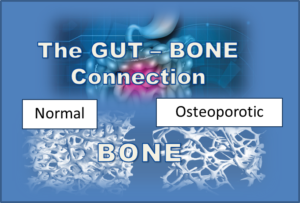
Is Your Gut Problem Causing Bone Loss?
Can Your Gut Microbes Affect Your Bone Health?
Newly conducted research performed at Michigan State University and published in the journal Current Osteoporosis Reportsreported finding the existence of a relationship between the health of your gut and the health of your bone.
The report found that an imbalance of healthy (probiotic) and unhealthy gut microbes (dysbiosis) leads to inflammation and leaky gut and may contribute to bone loss.
Researchers further found that gut microbes regulate the availability of nutrients that are important for bone and that balancing the healthy and unhealthy bacteria in the gut decreases inflammation, improves the integrity of the gut barrier and promotes the production of important chemicals made by gut bacteria that are necessary for maintaining healthy bone density.
Healthy bones require adequate amounts of calcium, phosphorus, vitamin D, vitamin K2, magnesium, B vitamins and vitamin C.
Taking calcium alone will not maintainthe integrity of your bones!
Your bone is constantly being broken down and rebuilt with new bone tissue. This process is called remodeling and is what gives bone continued strength. When breakdown exceeds buildup, your bone gets progressively weaker.
What Can Cause The Breakdown Of Your Bone?
Compromised Intestinal Barrier
- Bone loss is often seen in people who suffer with gastro-intestinal disorders due to the malabsorption of calcium, vitamin D K2 and other nutrients necessary to maintain proper bone mass.
- Consuming antibiotics, NSAIDS, acid inhibiting medications and eating the standard American diet, which is low in fiber and high in sugar, saturated fats, food additives, conventional dairy products and pesticides can cause a leaky gut.
- When you have a leaky gut, large cracks or holes in your gut lining allow tiny particles that should never enter your bloodstream to make their way through. When partially digested food, toxins and microbes enter your bloodstream, an inflammatory response follows. The production of inflammatory chemicals (cytokines) can lead to bone loss.
- Inflammation and gut dysbiosis can also decrease the absorption of nutrients needed to maintain bone health.
Hormone Imbalance and Estrogen Deficiency
- Sufficient estrogen levels are necessary in order to maintain a proper balance of good and bad bacteria in you intestine.
- Estrogen deficiency undermines intestinal microbial diversity and reduces the abundance of intestinal bacteria needed for immune homeostasis. This leads to an increase in the levels of bad bacteria, increasing inflammation.
- Estrogen deficiency increases intestinal permeability and leads to leakage of intestinal pathogens into the blood. This leads to an immune reaction (cytokines) which causes bone breakdown and bone loss.
- Your intestinal barrier absorbs nutrients and limits the penetration of intestinal antigens.
- Estrogen may indirectly promote vitamin D uptake and increase intestinal calcium absorption.
High Blood Sugar And High Insulin Levels
- A recent study has shown that when high amounts of insulin (as in type 2 diabetes) are present, circulating levels of osteocalcin (the protein that is critical for the formation of bone) decreases – within hours of an insulin surge.
- High blood sugar has been found to increase oxidative stress (chemical bullets that can damage every component of your cells, even your DNA). Oxidative stress promotes inflammation throughout your body and causes bone loss.
- Elevated blood sugar levels causes weaknesses in collagen. This means that if you have high blood sugar levels, your bone is more fragile and puts you at greater fracture risk.
Acidic pH
- Your bones are a storage tank for calcium compounds that regulate the acid-base balance of your blood. This balance must be maintained within a very narrow range.
- When your blood becomes even slightly too acid, alkaline calcium pounds are leached from your bones to reduce the acidity. Animal foods such as cheeses and meats don’t contain much alkaline material and not enough to neutralize all the acids they introduce into the bloodstream.
- When you consume high amounts of cheese and meat, your body must draw calcium compounds from your bone in order to restore optimal blood pH.
- On the other hand, when you consume fruits and vegetables, your body can buffer that acidity.
Lack Of Proper Exercise
- Exercise is known to increase bone density and improve overall bone health.
- Studies have shown the best exercise for maintaining healthy bone is exercise that places strain on the muscles and bones.
- Research has shown that increased bone density can be achieved with as little as 20 minutes of weight-bearing exercise (resistance training) performed three times per week.
- Exercise stimulates osteoblasts (cells that build bone) and also makes cells more sensitive to insulin – particularly in skeletal muscle.
- Studies have shown that even short-duration exertion can improve your blood glucose levels.
- A study of nurses found that walking four hours a week gave them a 41% lower risk of hipfractures, compared to walking less than an hour per week.
- Brisk walking is best, but you can adapt your speed to your current fitness level.
- Walking is free, and you can do it anywhere, anytime, even when you’re traveling.
Stress & High Cortisol Levels
- When you are stressed, your body releases adrenaline and cortisol.
- Chronic stress can lead to elevated cortisol levels.
- Elevated cortisol levels interfere with osteoblast (cells that form new bone) formation and dramatically deceases bone building – resulting in reduced bone density.
- High levels of cortisol promote a loss of minerals from you body and increase the acidity of your body.
- If your body remains in a state of chronic stress with elevated cortisol levels, your bone formation will be disrupted.
What To Do
- Obtain a GI –MAP DNA stool test – check for bacterial, viral & fungal pathogens, parasites, worms, balance of probiotic bacteria and levels of inflammation.
- Fix gut problems with antimicrobials, proper probiotics and a gut repair program.
- Once any bloating and gas stops, take prebiotic fiber and probiotics. Probiotic bacteria use prebiotic fiber as a fuel source and increase the
production of short chain fatty acids. Prebiotic fiber is thought to enhance bone density through increased production of short chain fatty acids (SCFSs). Short chain fatty acids are also thought to aid in calcium absorption.
- Obtain a DUTCH hormone urine test to check your levels of estrogen, progesterone, testosterone, cortisol and DHEA.
- Check your blood levels of vitamin D, glucose and insulin.
- Check morning urinary pH levels – should be 6.5 or higher, if 5.5 or less, you have a high risk of bone loss.
- Follow an anti-inflammatory, alkaline, elimination diet consisting of high amounts of organic vegetables (50-70% of what is on your plate), 3-4 ounces of organic chicken, turkey, lamb, wild caught fish, organic fruit, nuts, seeds, wild rice, quinoa and occasional grass fed beef.
- Take vitamin D, K2, a bone builder supplement, EPA/DHA omega 3 fatty acids and a multi vitamin/mineral supplement.
- Adaptogenic herbs (ashwagandha), holy basil, rhodiola, cordyceps mushrooms to support adrenal health and cortisol balance
- Reduce stress through exercise, yoga or meditation.
- The most life changing stress reduction information I have found is “The 3 Principles of Mind, Consciousness and Thought. This insightful information has brought peace and joy to my life.
Take a look and see if this resonates with you!
With love,
Dr. Gaila

